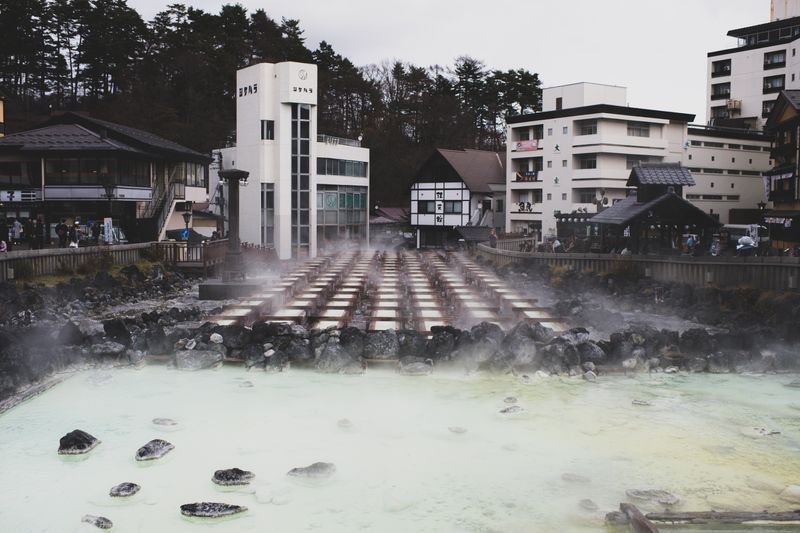May 29, 2019
Are onsen good for your health?

Kusatsu Onsen, Gunma Prefecture
The range of mineral content in the waters gushing from Japan’s hot springs varies widely, and temperatures range from 34 to over 42 Celsius. There is a long list of healing properties attributed to these hot springs - fatigue, arthritis, digestive problems, and skin conditions. But can hot springs really make you better? From my research and experience, I think they can do a lot to restore your physical and mental health.
The mineral content has real effects on the texture of your skin. Sodium hot springs have a strong cleansing effect and soften the skin. Hot springs with sulfur are suggested for resolving acne. The sulfur is antimicrobial, and it is widely recommended to help slough off hard skin that results from psoriasis and eczema. When you feel cleansed and fresh, and get relief from dry skin or acne, you feel better about yourself, too.
Around the world and in Japan, too, researchers claim that balneotherapy is valid natural medicine. While its effects are not confirmed, there appears to be some merit to soaking beyond just improvement of skin health.
When you immerse yourself in hot, mineral-laden water, you float, which takes pressure off muscles and joints. Some research suggests that the pressure of the water, too, has an effect. The blood that pools in your legs is pushed by the pressure, and that results in better blood circulation.
From my own experience, I’ve found real and surprising effects from onsen soaks. Not far from home are two onsen, both sodium chloride hot springs. The two onsen are great places to get away from the daily grind and feel healthy.
Japan’s indigenous religion prescribes ritual bathing before ceremonies and for mental focus, and I find these onsen are places to take time and really focus on the task at hand, bathing. Of course, I bathe daily, and take baths at home a few times a week, but just leisurely cleansing with no distractions is important self care.
The onsens have many different pools at different temperatures, and both indoor and outdoor lounging spaces. The sodium content makes my skin feel softer and even tighter. I’m sure part of the effect is from hydration from the hot water and plenty of drinking water I take in.
The baths have cozy sleeping areas and gorgeous gardens. While in the onsen building, guests wear kanchaku, shorts and jacket set, made of soft, traditional Japanese textiles. Kanchaku are comfortable and allow freedom of movement.
I think another effect is community, too. Some onsen experiences I’ve had are meditative and quiet, with all bathers taking time for relaxation and healing. Though silent, you are together with others who are focused on relief and relaxation. At other times, I’ve been counseled by elderly ladies on health and life stuff. The bath is a place where many people socialize and become reflective. Perhaps the most surprising experience I’ve had is elderly ladies coaching younger women on breast health. A thoughtful older lady shared her experience of breast cancer survival in a way that put us younger bathers at ease, and she encouraged us not to be shy to talk about female reproductive health.
I go a few times a month, when I have time, to local spots, and a few times a year to onsen resorts. No doubt fresh air and beautiful scenery are also a source of healing as part of onsen therapy.
Some Chiba, Ibaraki, and Saitama area onsen my friends and I keep going back to are:
Noda Onsen Honoka for great value. The admission includes the ganbanyoku stone bath and sauna.
Kasukabe Yumoto Onsen is a local landmark, but I recommend another cheaper one, Yuraku no Sato, just east of Kasukabe Station. It’s got great decor, mineral-laden and carbonated onsen water.
On the Tone River in the Ibaraki countryside is Goroko no Yu which has strong salt water great for the skin. The decor is fun and kitschy, and they have a small theater for samurai dramas and enka performances.



1 Comment
ReishiiTravels
on May 29
I really enjoyed this read! Guess where I am now going to go this weekend! XD XD